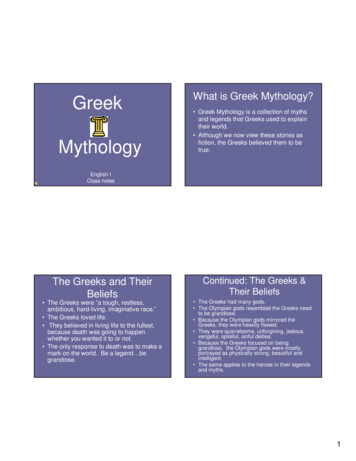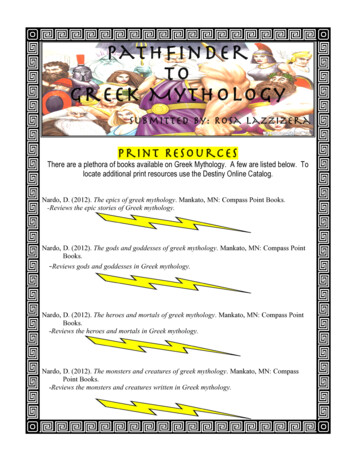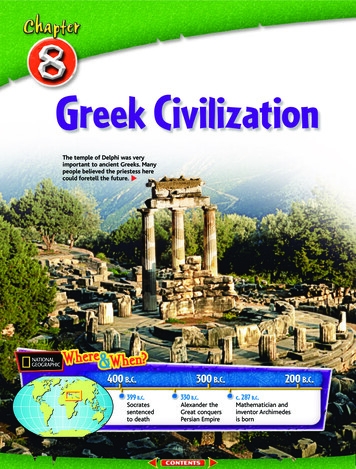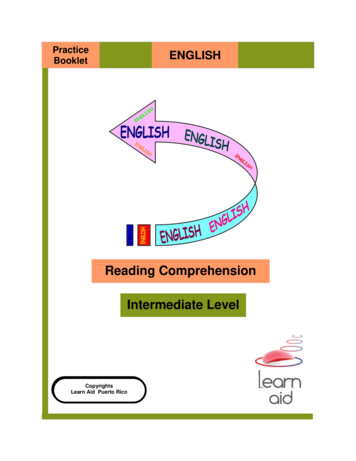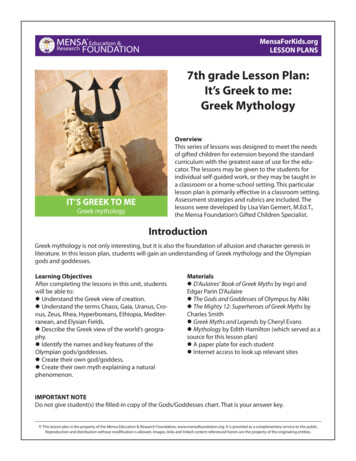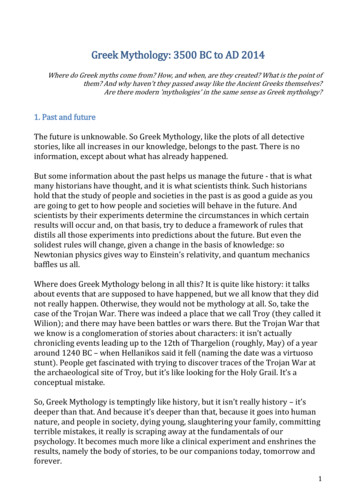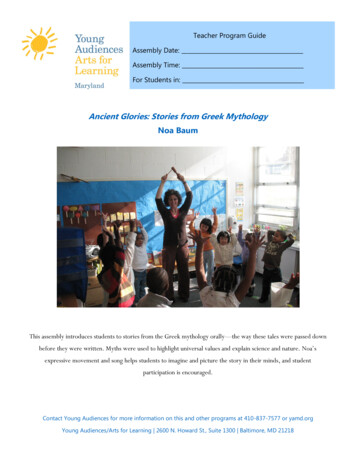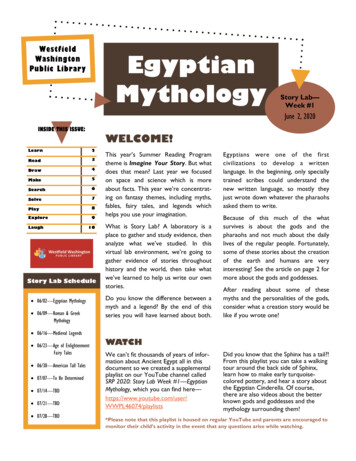
Transcription
Document belonging to the Greek Mythology Link, a web site created by CarlosParada, author of Genealogical Guide to Greek MythologyCharacters Places Topics Images Bibliography Español PDF EditionsAbout Copyright 1997 Carlos Parada and Maicar Förlag.This PDF contains portions of the Greek Mythology Link COMPLETE COLLECTION, version0906.In this sample most links will not work.THE COMPLETE GREEK MYTHOLOGY LINK COLLECTION (digital edition) includes:1. Two fully linked, bookmarked, and easy to print PDF files (1809 A4 pages), including:a. The full version of the Genealogical Guide (not on line) and every page-numbered document detailed in the Contents.b. 119 Charts (genealogical and contextual) and 5 Maps.2. Thousands of images organized in albums are included in this package.The contents of this sample is copyright 1997 Carlos Parada and Maicar Förlag.To buy this collection, visit Editions.
Greek Mythology LinkContentsThe Greek Mythology Link is a collection of myths retold by Carlos Parada, authorof Genealogical Guide to Greek Mythology, published in 1993 (available atAmazon). The mythical accounts are based exclusively on ancient sources.Address: www.maicar.comAbout, Email.Copyright 1997 Carlos Parada and Maicar Förlag.ISBN 978-91-976473-9-7VIII DivinitiesMajor DivinitiesImmortalsOther deitiesContentsPageI AbbreviationsII DictionariesGenealogical Guide (6520 entries)Geographical Reference (1184)III Biographies (209)IV GROUPS (56)V Places and Peoples (34)VI On the MythsGetting acquainted with the mythsBasic aspects of the Greek mythsBrief history of the Greek mythsThe Munificence of the MythsThe Children of the MythsThe Ages of the WorldThe Era of ZeusMeeting Medea or not"Is it True?"Mythological Variants in Isidore's EtymologiesVII Events (in chronological order):Myths of CreationCastration of UranusTitanomachyThe Ages of ManThe Flood of Deucalion 1The DANAIDS kill their husbandsGigantomachyThe Voyage of the ARGONAUTSCalydonian Boar Hunt (CALYDONIAN HUNTERS)The War of the SEVEN AGAINST THEBESThe War of the EPIGONIThe Trojan WarDares' Account of the Destruction of TroyThe Last Days of TroyAftermath of the Trojan War and ReturnsOdysseus kills the SUITORSThe Wanderings of AeneasSummaries of the Trojan CycleThe Return of the HERACLIDESColonization of IoniaRomulus & the Foundation of Rome21476147714801486IX MiscellaneaThree Main AncestorsRobe & Necklace of Harmonia 1The PelopidesMythical ObjectsThe PalladiumWineSuicidesMurdersThe Seven Sages of GreeceSing goddessCroesusDisney's and the original Hercules comparedThe Exile of the Gods - Edward GibbonA Mythological Sketch - Margaret FullerEpimetheus (one-act 41814201426X GreekThe Greek Alphabet, and note about itGreek-Latin CorrespondencesNames of Characters in Greek 144414521457146012565581463117413231028XI ncient authors)(in chronological order)(order of events)(modern authors)XII IndicesXIII Catalogue of Images(Images illustrating the texts:154915501552158115911594159716021649ca. 631)XIV About the Greek Mythology LinkGGGMXV Charts and MapsGenealogical Charts (105)Contextual Charts (14)Mythological Maps 7153915421544166216641671167217781793
Document belonging to the Greek Mythology Link, a web site created by Carlos Parada, author of Genealogical Guide to Greek MythologyBiographies GROUPS Places & Peoples Dictionaries ImagesCopyright 1997 Carlos Parada and Maicar Förlag.Abbreviations* The poems of The Epic Cycle and the Hesiodic fragments have been indicated following the numbering given in H. G. Evelyn-White'stranslation (Hesiod, the Homeric Hymns and Homerica, Loeb Classical Library, 1982). The same applies to Mimnermus, translated by J. M.Edmonds (Elegy and Iambus, Loeb Classical Library, 1961). The sources behind those numbered fragments follow the abbreviation.Ael.VH. Aelian, Varia HistoriaAes.Aga. Aeschylus, Agamemnon.Aes.Eum. Aeschylus, Eumenides.Aes.LB. Aeschylus, Libation-Bearers.Aes.Pro. Aeschylus, Prometheus Bound.Aes.Sev. Aeschylus, Seven Against Thebes.Aes.Supp. Aeschylus, The Suppliant Maidens.*AETH. The Aethiopis (The Epic Cycle).*Hes.ID. Hesiod, The Idaean Dactyls.1 Pliny, Natural History 7.56, 197 and Clement,Stromateis 1.16.75.*Hes.Mel. Hesiod, The Melampodia.12381 Proclus, Chrestomathia, 2.3 Schol. on Pindar, Isth. 3.53.AO. [Orpheus], Argonautica Orphica.Apd. Apollodorus, Library.Apd.Ep. Apollodorus, Library "Epitome".Apu.Tra. Apuleius. The Golden Ass.Ara.Phae. Aratus of Soli, Phaenomena.Arg. Apollonius Rhodius, Argonautica.Ari.Birds. Aristophanes, The Birds.Ath. Athenaeus, Deipnosophistae.Cal.Ap. Callimachus, Hymn to Apollo.Cal.Ar. Callimachus, Hymn to Artemis.Cal.BP. Callimachus, On the Bath of Pallas.Cal.Del. Callimachus, Hymn to Delos.Cal.Dem. Callimachus, Hymn to Demeter.Cal.Ze. Callimachus, Hymn to Zeus.Call. Callistratus, DescriptionsCic.ND. Cicero, De Natura Deorum (The Nature of the Gods).Clem.EG. Clement of Alexandria, Exhortation to the Greeks.Col. Colluthus, The Rape of Helen.Con. Conon, Narratives (Diegeseis).*CYP. The Cypria (The Epic Cycle).13 Aristoph. Lysistr. 155 and Schol.14 Schol. Lycophr. Alex. 1268.Lib.Met. Antoninus Liberalis, Metamorphoses.Long. Longus, Daphnis and Chloe.Man. Manilius, Astronomica.*Mimn. Mimnermus, Elegies, Nanno, Fragments.8 Athenaeus, Deipnosophistae.18 Athenaeus, Deipnosophistae.19 Aelian, Historical Miscellany.21 Argument to Sophocles Antigone.22 Tzetzes on Lycophron.23 Collection of Proverbs.Nonn. Nonnus, Dionysiaca.DH. Dionysius of Halicarnassus, Roman Antiquities.Dio. Diodorus Siculus, The Library of History.Epict. Arrian's Discourses of Epictetus (Epicteti Dissertationes).*EPIG. The Epigoni (The Epic Cycle).2 Photius, Lexicon.3 Schol. on Ap. Rhod. 1.308.*OED. Oedipodea (The Epic Cycle).Eur.Alc. Euripides, Alcestis.Eur.And. Euripides, Andromache.Eur.Bacc. Euripides, Bacchanals.Eur.Cyc. Euripides, Cyclops.Eur.Ele. Euripides, Electra.Eur.Hcl. Euripides, Heraclides.Eur.Hec. Euripides, Hecabe.Eur.Hel. Euripides, Helen.Eur.Her. Euripides, Heracles.Eur.Hipp. Euripides, Hippolytus.Eur.Ion. Euripides, Ion.Eur.IA. Euripides, Iphigenia in Aulis.Eur.IT. Euripides, Iphigenia in Tauris.Eur.Med. Euripides, Medea.Eur.Ore. Euripides, Orestes.Eur.Phoe. Euripides, Phoenician Women.Eur.Rhe. Euripides, Rhesus.Eur.Supp. Euripides, Suppliants.Eur.Tro. Euripides, Daughters of Troy.Gell. Aulus Gellius, Attic Nights.Hdt. Herodotus, History.*Hes.Aeg. Hesiod, Aegimius.3 Schol. on Eur.Phoen.1750.Ov.AA. Ovid, Artis Amatoriae.Ov.Fast. Ovid, Fasti.Ov.Her. Ovid, Heroides.Ov.Met. Ovid, Metamorphoses.Ov.Pont Epistulae ex Ponto.Parth. Parthenius of Nicaea, Love Romances.Pau. Pausanias, Description of Greece.Phil.Im. Philostratus, Imagines.Phil.VA. Flavius Philostratus, Vita Apollonii (Life of Apollonius ofTyana).Pin.Isth. Pindar, Isthmian Odes.Pin.Nem. Pindar, Nemean Odes.Pin.Oly. Pindar, Olympian Odes.Pin.Pyth. Pindar, Pythian Odes.Pla.Apo. Plato, ApologyPla.Cra. Plato, CratylusPla.Cri. Plato, Critias.Pla.Euth Plato, Euthyphro.Pla.Gorg. Plato, Gorgias.Pla.Ion Plato, Ion.Pla.Laws Plato, Laws.Pla.Phaedo Plato, Phaedo.Pla.Phae. Plato, Phaedrus.Pla.Pro. Plato, Protagoras.Pla.Rep. Plato, Republic.Pla.Soph. Plato, Sophist.Pla.Sta. Plato, Statesman.Pla.Sym. Plato, Symposium.Pla.Tim. Plato, Timaeus.Plu.GQ. Plutarch, Moralia (Greek Questions).Plu.Mor. Plutarch, Moralia.Plu.PS. Plutarch, Moralia (Greek and Roman Parallel Stories).Plu.Sup. Plutarch, Moralia (Superstition).4 Herodian in Stephanus of Byzantium.6 Scholiast on Homer, Il.24.24.*Hes.Ast. Hesiod, Astronomy. Strabo, 14. p. 642.Tzetzes on Lycophron, 682.Scholiast on Homer, Odyssey 10.494.Strabo, 14. p. 676.Hes.SH. Hesiod, Shield of Heracles.Hes.The. Hesiod, Theogony.Hes.WD. Hesiod, Works and Days.Hom.Aph. Homeric Hymn to Aphrodite.Hom.Apo. Homeric Hymn to Apollo.Hom.Ar. Homeric Hymn to Ares.Hom.Asc. Homeric Hymn to Asclepius.Hom.Dem. Homeric Hymn to Demeter.Hom.Dion. Homeric Hymn to Dionysus.Hom.Hel. Homeric Hymn to Helius.Hom.Herm. Homeric Hymn to Hermes.Hom.Il. Homer, Iliad.Hom.Od. Homer, Odyssey.Hom.Pan. Homeric Hymn to Pan.Hom.Sel. Homeric Hymn to Selene.Hyg.Ast. Hyginus, Poetica Astronomica.Hyg.Fab. Hyginus, Fabulae.Hyg.Pre. Hyginus, Fabulae, "Preface".*LI. The Little Iliad (The Epic Cycle).1 Proclus, Chrestomathy, 1.3 Schol. on Homer, Il.1.5.5 Schol. on Homer, Il.17.140.7 Clement of Alexandria, Protrept 2.30.5.8 Athenaeus, 8.334 B.9 Schol. on Eur. Andr.898.11 Schol. on Homer, Il.3.242.12 Schol. on Pindar, Nem.10.114.1234 Scholiast on Pindar, Nem.2.16.Scholiast on Aratus 254.Pseudo-Eratosthenes Catast. frag. 1.Pseudo-Eratosthenes Catast. frag. 32.*Hes.CW. Hesiod, Catalogues of Women ("Appendix" in H. G.Evelyn-White's translation.)2
Plu.Alc. Plutarch, Parallel Lives (Alcibiades).Plu.Cim. Plutarch, Parallel Lives (Cimon).Plu.Lys. Plutarch, Parallel Lives (Lysander).Plu.Num. Plutarch, Parallel Lives (Numa).Plu.Pyrrh. Plutarch, Parallel Lives (Pyrrhus).Plu.Rom. Plutarch, Parallel Lives (Romulus).Plu.RQ. Plutarch, Moralia (Roman Questions).Plu.Sol. Plutarch, Parallel Lives (Solon).Plu.The. Plutarch, Parallel Lives (Theseus).Prop. Propertius, Elegies.QS. Quintus Smyrnaeus, The Fall of Troy.*RET. The Returns (The Epic Cycle).19A Oxyrhynchus Papyri 1358 fr. 1 (3rd cent. A.D.)40A Oxyrhynchus Papyri 1358 fr. 2.*Hes.CWE. Hesiod, Catalogues of Women and Eoiae.1 Scholiast on Arg.3.1086.2 Ioannes Lydus, de Mens.1.13.3 Constantinus Porphyrogenitus, de Them. 2 p. 48 B.4 Plutarch, Mor. p. 747; Schol. on Pindar Pyth. 4.263.6 Scholiast on Apollonius Rhodius, Arg.1.482.7 Berlin Papyri 7497 and Oxyrhynchus Papyri, 421.8 Scholiast on Apollonius Rhodius Arg.4.57.9 Scholiast Ven. on Homer, Il.11.750.11 Stephanus of Byzantium, s.v. Gerenia.12 Eustathius, Hom.1796.39.13 Scholiast on Homer, Od.12.69.14 Petrie Papyri (ed. Mahaffy), Pl.III.4.19 Scholiast on Homer, Il.12.292.20 Scholiast on Apollonius Rhodius, Arg.2.178.24 Scholiast on Homer, Il.23.679.25 Herodian in Etymologicum Magnum, p. 60, 40.27 Scholiast on Homer, Il.7.9.31 Strabo, 5. p. 221.38 "Eratosthenes", Catast.19. p. 124.39 Scholiast on Apollonius Rhodius, Arg.2.181.47 Scholiast on Apollonius Rhodius, Arg.4.892.49 Scholiast on Homer, Od.7.54.58 Strassburg Greek Papyri 55 (2nd cent. A.D.)63 Pausanias, 2.26.7.65 Scholiast on Pindar, Oly.9.79.66 Scholiast on Pindar, Nem.10.150.67 Scholiast on Euripides, Orestes 249.68 Berlin Papyri, 9739-10560.69 Tzetzes, Exeg. Iliad. 68. 19 H.70 Laurentian Scholiast on Sophocles' Electra 539.72 Eustathius, Hom.13.44.sq.79 Schol. on Soph.Trach.266.83 Tzetzes, Schol. in Exeg. Iliad. 126.84 Scholiast on Homer, Od.11.326.86 Eustathius, Hom. 1623. 44.89 Schol. on Pindar, Pyth.3.48.91 Philodemus, On Piety, 34.96 Palaephatus, c.42.98 Berlin Papyri, No. 9777.99A Schol. on Homer, Iliad.23.679.99 Papyri greci e latine, No. 131 (2nd-3rd century).1246 Proclus, Chrestomathia.Argument to Eur., Medea.Eustathius, 1796. 45.Athenaeus 281B.*SI. The Sack of Ilium (The Epic Cycle).1 Proclus, Chrestomathia.4 Schol. on Eur. Troades 31.5 Eustathius on Iliad 13.515.Soph.Aj. Sophocles, Ajax.Soph.Ant. Sophocles, Antigone.Soph.Ele. Sophocles, Electra.Soph.OC. Sophocles, Oedipus at Colonus.Soph.OT. Sophocles, Oedipus the King.Soph.Phi. Sophocles, Philoctetes.Soph.Tra. Sophocles, Trachinian Women.Stat.Achil. Statius, Achilleid.Stat.Theb. Statius, Thebaid.Strab. Strabo, Geography.Strab.Fra. Strabo, Geography, Fragments of Book VII.*TEL. The Telegony (The Epic Cycle).1 Proclus, Chrestomathia.2 Eustathius, 1796. 35.*TIT. The Titanomachy.(The Epic Cycle).1236 Photius, Epitome of the Chrestomathy of Proclus.Anecdota Oxon. (Cramer) 1.75.Schol. on Ap.Rhod.1.1165.Schol. on Ap.Rhod.1.554.Try. Tryphiodorus, The Taking of Ilios.Val. Valerius Flaccus, Argonautica.Vir.Aen. Virgil, Aeneid.Vir.Geo. Virgil, Georgics.*Hes.DF. Hesiod, Doubtful Fragments.5 Servius on Vergil, Aen.4.484.*Hes.Fra. Hesiod, Fragments [of Unknown Position.]1 Diogenes Laertius, 8.1.25.2 Schol. on Homer, Odyssey, 4.232.*Hes.GE. Hesiod, The Great Eoiae.6 Schol. on Pindar, Pyth.4.35.11 Scholiast on Apollonius Rhodius, Arg.4.57.12 Scholiast on Apollonius Rhodius,Arg.1.118.13 Scholiast on Apollonius Rhodius,Arg.4.828.15 Scholiast on Apollonius Rhodius,Arg.1.1122.The "Addendum" in some pages may contain some additionalabbreviations:Eratosthenes, Catast. Eratosthenes, Katasterismoi.Fulg.Myth. Fulgentius, Mitologiae tres libri.Phil.Her. Philostratus, Heroicus.Pto.Heph. Ptolemy Hephaestion (Ptolemy Chennus--in Photius).Roscher, Lex. W. H. Roscher: Ausfürliches Lexikon der griechischen un römischenMytologie.Serv. on Vir.Aen Servius on Virgil's Aeneid.7912: Dione. Sir John Soane'sMuseum, London.3
Document belonging to the Greek Mythology Link, a web site created by Carlos Parada, author of Genealogical Guide to Greek MythologyBiographies GROUPS Places & Peoples Dictionaries ImagesCopyright 1997 Carlos Parada and Maicar Förlag.DictionariesGenealogical GuideGeographical ReferenceLonger articles are at BiographiesLonger articles are at Places & PeoplesThe following symbols and abbreviations have beenused:N:, D:, G:, *, &, **, ***, ƻ, and .Blank spaces in connection with these symbols mean"unknown", at least for the sources supporting thisDictionary. Moreover, in all cases "1)", "2)", etc.stand for a sequence and "a)", "b)", etc. point outdifferent alternatives.Abarbarea 1 to AetiusAetnaeus to AlthaemenesAlthepus to AntilochusAntimache to ArsippeArtaceus to BoetisBoeus to CephisusCerambus to ClytodoraClytomedes to DamarmenusDamasen to DraciusDraco to EreuthusErgeus to EuryteleEurythemis to HecaleHecamede to HygiaHylactor to IsanderIschepolis to LeucopeusLeucophrye to MeanderMecionice to MineusMinis to NyctimeneNyctimus to OrthosieOrthus to PeriusPernis to PhyliusPhylleus to PriapusPrias to SancusSandocus to TalasiusTalaus to ThoosThoosa to ZorusEach entry begins with the Name of the person,often followed by a short Description. These arereferred in the sources as N: ( Name) and D: ( Description). When a particular entry can also befound in the GROUPS, the name of the Group(always written in capital letters) is indicated beforethe sources, which come last. In the sources theGroups are referred as G: ( Group), and whennumbered, as G1:, G2:, etc. The Contents of theChapter GROUPS shows which collective entries canbe found.The data is organized in the following way:* origin, i.e. in most cases, parents, "*a)", "*b)",etc., showing different alternatives. The father isalways named first, followed by the symbol "&",signifying union with the mother, who always followsthat symbol. In the cases in which one parent isunknown the symbol "&" will still be there (after thefather's name or preceding the mother's). When theparentage consists of only one person the symbol"&" has been omitted.** mates, i.e. wives, husbands or lovers, "**1)","**2)" , etc. showing that there have been severalwives or lovers (the numbers do not necessarilyshow the chronological order), and "**a)", "**b)",etc. showing different alternatives or versions.*** offspring. "***1)", "***2)" etc., or "***a)", "***b)", etc. correspond to theinformation given about mates, so that the child under, for instance, "***2)" is theson or daughter of the husband or wife under "**2)".ƻ Includes an account of the circumstances of death and/or metamorphosis,"ƻa)", "ƻb)", etc. standing for different versions. The symbol "ƻ" followed by aproper name is to be read as "killed by" (e.g. "ƻAchilles" "Killed by Achilles"). and These symbols preceding a name and its source facilitate reference:the name preceded by it will be found in the source bearing the same symbol.[The sources given in brackets are preceded by the symbols corresponding to theinformation they refer to. For the names of authors and works quoted in thesources; see Abbreviations.]Quick KeyNumbering ofnamesakes: TheName (N:). Name of the character.subscript numbers Description (D:). Short account of the character’s life.*Father & Mother: "a)", "b)", etc. for opposite versions.following the**Mates: "a)", “b)", etc. for opposite versions; "1)", "2)", etc. for several mates.names are for***Children, bearing the same letter or number of preceding parent.identificationƻAccount of Death and/or Metamorphosis "a)", "b)", etc. for opposite versions.purposes onlyGROUPS (G:), Name of the Group(s) in whose list(s) the name can be found.[Sources bearing symbols corresponding to the material they refer to.]They areconsistentthroughout all texts but do not point out a chronological order. The absence of anumber indicates that there is only one mythological character with that particularname. The numbers do not belong originally to the names.4The geographical index is virtuallycomplete regarding the followingauthors and works: Apollodorus, TheLibrary and Epitome; ApolloniusRhodius, Argonautica; Callimachus,Hymns; Hesiod, Theogony; Homer, TheIliad; Homer, The Odyssey; Hyginus,Fabulae; Nonnus, Dionysiaca; Ovid,Metamorphoses.And selective regarding the following:Aeschylus, Seven Against Thebes;Dionysius of Halicarnassus, The RomanAntiquities; Diodorus Siculus, TheLibrary of History; Euripides, Iphigeniain Aulis; Herodotus, History; Hesiod,Abae to ByzeresCatalogues of Women and Eoiae;Cabeiraea to ElysiumHesiod, The Melampodia; Hyginus,Emathia to LycastusPoetica Astronomica; AntoninusLyceum to PhiciumLiberalis, Metamorphoses; Ovid, Fasti;Phigalia to ZoneParthenius of Nicaea, Love Romances;Pausanias, Description of Greece;Pindar, Pythian Odes; Plutarch, MoraliaMap of Greece(Greek Questions); Plutarch, Moralia(Greek and Roman Parallel Stories); Plutarch, Parallel Lives (Romulus);Quintus Smyrnaeus, The Fall of Troy; Strabo, Geography; Valerius Flaccus,Argonautica; Virgil, The Aeneid;
Document belonging to the Greek Mythology Link, a web site created by Carlos Parada, author of Genealogical Guide to Greek MythologyBiographies GROUPS Places & Peoples Dictionaries ImagesCopyright 1997 Carlos Parada and Maicar Förlag.Genealogical GuideAbarbarea 1 to AetiusGenealogical GuideAbbreviationsAbarbarea 1 to AetiusAetnaeus to AlthaemenesAlthepus to AntilochusAntimache to ArsippeArtaceus to BoetisBoeus to CephisusCerambus to ClytodoraClytomedes to DamarmenusDamasen to DraciusDraco to EreuthusErgeus to EuryteleEurythemis to HecaleHecamede to HygiaHylactor to IsanderIschepolis to LeucopeusLeucophrye to MeanderMecionice to MineusMinis to NyctimeneNyctimus to OrthosieOrthus to PeriusPernis to PhyliusPhylleus to PriapusPrias to SancusSandocus to TalasiusTalaus to ThoosThoosa to ZorusQuick Key:N: Name of the character.D: Short account of the character*Father & Mother: "a)", "b)", etc. foropposite versions.**Mates: "a)", "b)", etc. for oppositeversions; "1)", "2)", etc. for severalmates.***Children, bearing the same letter ornumber of preceding parent.ƻAccount of Death and/orMetamorphosis "a)", "b)", etc., fordifferent versions.G: Name of the Group(s) in which thecgaracter can be found.[Sources bearing symbolscorresponding to the material theyrefer to.]Complete keyGeographical referenceAbae to ByzeresCabeiraea to ElysiumEmathia to LycastusLyceum to PhiciumPhigalia to ZoneAbarbarea 1.A naiad. She often reproached Nicaea for having killed Hymnus. She consorted with Bucolion 2, son of KingLaomedon 1 of Troy, and had sons by him, Aesepus 2 and Pedasus 1, who were killed by Euryalus 1 during theTrojan War.***Bucolion 2.***Aesepus 2.Pedasus 1.G:NYMPHS.[D:Nonn.15.378. D:-**-***Hom.Il.6.21ff.]Abarbarea 2.One of the three Naiads who are at the origin of the Tyrian race. They were joined to sons of the soil is 1.A Caucasian, who was in the court of Cepheus 1 and was killed by Perseus 1 along with the ETHIOPIAN CHIEFS.G:ETHIOPIAN CHIEFS.[D:-ƻOv.Met.5.86.]Abaris 2.An ally of Turnus, the man who resisted Aeneas in Italy. He was killed by Euryalus 7[D:-ƻVir.Aen.9.344.]Abaris 3.One of the Dolionians; he was killed by Jason during the battle between the Dolionians and the ARGONAUTS[D:-ƻVal.1.152.]Abaris 4.One of the Hyperboreans (Hdt.4.36). He is reported (in Suda s.v.) as a Scythian, son of Seuthes. He is said tohave written several works, among which a Theogony and Arrival of Apollo among the Hyperboreans. Hetravelled on an arrow that Apollo had given him, both from Scythia to Hellas and from Hellas to HyperboreanScythia. When there once was a plague in the whole inhabited world, the oracle of Apollo told both to Greeksand barbarians that 'the Athenian people should make prayers on behalf of all of them.' So, many peoples senttheir ambassadors to Athens, Abaris coming, as ambassador of the Hyperboreans, in the third Olympiad.[D:Hdt.4.36.]Abas 1.Abas 1 was king in the island of Euboea, where the inhabitants were called Abantians after him. He was fatherof Canethus 1 and, some say, of Canthus 1. Canethus 1 is counted among the ARGONAUTS.*Poseidon & Arethusa 1.*****Canethus 1.Canthus 1.G:POSEIDON'S OFFSPRING.[D:Arg.1.77, Hom.Il.2.536ff. *Hyg.Fab.157. ***Arg.1.77, Val.1.451.]Abas 2.See Argos.*Lynceus 2 & Hypermnestra 1.**1)Aglaia 2.**2)***1)Acrisius.Proetus 1.***2)Lyrcus 1.[D:Pau.10.35.1. *-**1)-***1)Apd.2.2.1. ***1)Pau.2.16.2, 2.12.2. **2)-***2)Pau.2.25.5.]Abas 3.*Melampus 1 & Iphianira 1.**Cyrene.***Lysimache 1. Idmon 2. Coeranus 1.[*-***Apd.1.9.13. **-*** Hyg.Fab.14. *** Pau.1.43.5.]Abas 4.Attended Pirithous' wedding, fought against the LAPITHS and fled.*See CENTAURS.G:CENTAURS.[D:-G:Ov.Met.12.306.]Abas 5.Killed by Diomedes 2.*Eurydamas 3 &G:TROJANS.[*-ƻHom.Il.5.148.]Abas 6.One of the ETHIOPIAN CHIEFS who were in the court of Cepheus 1 at the moment of the fight between Phineus 1 and Perseus 1.G:ETHIOPIAN CHIEFS.[D:Ov.Met.5.126.]5
Abas 7.A companion of the exiled Aeneas. He was killed by Lausus 1, the man who led one thousand soldiers from the town of Agylla against Aeneas inItaly.[D:Vir.Aen.1.120. ƻVir.Aen.10.428.]Abas 8.Killed by Sthenelus 2, a leader from Argos.G:TROJANS.[D:-ƻQS.11.81.]Abas 9.Defender of Thebes against the SEVEN, Abas 9 was killed in battle. His sons Cydon 7 and Argus 9 were killed in the same war by Parthenopaeus,known as son of Atalanta .******Cydon 7.Argus 9.[D:-ƻStat.Theb.7.646. ***Stat.Theb.9.758.]Abas 10.Comrade of Diomedes 2 in Italy. He was turned into a Abderus came from Opus in Locris. He was Heracles 1's favourite, and the city of Abdera, founded by the latter, was named after him. Abderus,who was son of Hermes, was killed by the MARES OF DIOMEDES 1.*Hermes &G:HERMES' OFFSPRING.[D:-*-ƻApd.2.5.8.]Abia.Nurse of Glenus. After her the city Abia in Messenia was called. Glenus is son of Heracles 1 and Deianira 1.[D:Pau.4.30.1.]Ablerus.Killed by Antilochus, son of Nestor.G:TROJANS.[ƻHom.Il.6.32.]Abraxas.One the horses of HeliusG:BESTIARY.[D:Hyg.Fab.183.]ABSTRACTIONS.List of Personifications: Ananke, Anteros, Apatis, Astraea, Ate,Eunomia, Geras, Gymnastica, Harmonia 3, Himerus, Homonia,Momos, Moros, Musica, Nemesis, Nike, Oizys, Oniros, PanaceaTyche, Volupta, Zelos.Bia, Chaos, Chronos, Cratos, Deimos, Dike, Eirene 1, Envy, Erebus, Eris, Eros,Hybris, Hygia, Hypnos, Ker and Keres, LITAE, Lyssa, Maniae, Mnemosyne, MOERAE,1, Peitho 1, Pheme, Philotes, Phobus 1, Plutus, Poine, Pothos, Psyche, Thanatos,Absyrtus. (See Apsyrtus.)[N:Cic.ND.3.48, Hyg.Fab.23, Val.5.457.]Acacallis. (See Acalle.)[N:Arg.4.1490ff., Pau.10.16.5.]Acacus.Said to have reared Hermes in Arcadia*See LYCAON 2'S OFFSPRING.G:LYCAON 2'S OFFSPRING.[D:Pau.8.36.10. N:Pau.8.3.1ff.]Academus.When Theseus abducted Helen the DIOSCURI attacked Athens, demanding their sister back. When the people of the city said that they do nothave the girl Academus, who had learned in some way or other of her concealment at Aphidnae, told the DIOSCURI about it. For this reason hewas honoured during his lifetime by them, and long afterwards when the Lacedaemonians invaded Attica they spared the Academy, which hadbeen called after him.[D:Plu.The.32.3.]Acallaris.*Eumedes 6 &**Tros 1.***Assaracus.[*-**-***DH.1.62.2.]Acalle. (Acacallis.)*a)Minos 2 & Pasiphae.*b)Minos 2 & Crete 1.**1)Hermes.**2)Apollo.***1)Cydon 1.***2)Amphithemis 1.Phylacides.Philander. Miletus.[*a)b)Apd.3.1.2. **1)-***1)Pau.8.53.4. D:-**2)-***2)Arg.4.1490ff. D:-**2)-***2) Lib.Met.30. D:-***2)Pau.10.16.5.]Acamans.This Cyclops lived in the company of Pyracmon in Pelorum (north-east coast of Sicily).G:CYCLOPES.[D:Val.1.583.]Acamantis.*Danaus 1 &6
Document belonging to the Greek Mythology Link, a web site created by Carlos Parada, author of Genealogical Guide to Greek MythologyBiographies GROUPS Places & Peoples Dictionaries ImagesCopyright 1997 Carlos Parada and Maicar Förlag.Geographical ReferenceAbae to ByzeresAbae. City in Phocis, the region bordering the Gulf of Corinth west of Boeotia. According to the people of Abaethey migrated from Argos to Phocis, the city having received its name by its founder Abas 2, son ofHypermnestra 1 (one of the DANAIDS). In Abae there was an oracle of Apollo [Pau.10.35.1].Genealogical GuideAbbreviationsAbarbarea 1 to AetiusAetnaeus to AlthaemenesAlthepus to AntilochusAntimache to ArsippeArtaceus to BoetisBoeus to CephisusCerambus to ClytodoraClytomedes to DamarmenusDamasen to DraciusDraco to EreuthusErgeus to EuryteleEurythemis to HecaleHecamede to HygiaHylactor to IsanderIschepolis to LeucopeusLeucophrye to MeanderMecionice to MineusMinis to NyctimeneNyctimus to OrthosieOrthus to PeriusPernis to PhyliusPhylleus to PriapusPrias to SancusSandocus to TalasiusTalaus to ThoosThoosa to ZorusQuick Key:N: Name of the character.D: Short account of the character*Father & Mother: "a)", "b)", etc. foropposite versions.**Mates: "a)", "b)", etc. for oppositeversions; "1)", "2)", etc. for severalmates.***Children, bearing the same letter ornumber of preceding parent.ƻAccount of Death and/orMetamorphosis "a)", "b)", etc., fordifferent versions.G: Name of the Group(s) in which thecgaracter can be found.[Sources bearing symbolscorresponding to the material theyrefer to.]Complete keyAbantes. People from Euboea, the large island off the eastern coast of Boeotia and Locris. The Abantes wereprobably called after Abas 1, son of Poseidon, and Euboea was then called Abantis. During the reign ofChalcodon 1, the Abantes waged war against Thebes, their king falling in battle killed by Amphitryon. Later theAbantes, long-haired spearmen, took part in the expedition against Troy, being led by Elephenor, son ofChalcodon 1 and counted among the ACHAEAN LEADERS. On their return from Troy a group of Abantes, havingbeen scattered, landed in the Ceraunian mountains (in Epirus, north of Corcyra) and there founded asettlement Thronium that later was conquered by neighbours of Corinthian origin. Some of the Abantes aresaid to have migrated to Chios (the Aegean island off the coast of Ionia in Asia Minor) then ruled byOenopion 1 (son of Ariadne). In time Oenopion 1 and his sons were succeeded by Amphiclus 2, a man fromHistiaea in Euboea, who had come to Chios following and oracle from Delphi. However three generations afterAmphiclus 2, the Abantes who were in Chios were defeated by Hector 2 who, having become king, forced themto leave the island along with a number of Carians who had settled there. The Abantes are said to have playedan important part in the colonization of Ionia, although as they say, they were not Ionians themselves, havingmingled with many other nations [Apd.1.9.26, 2.6.2, 2.7.7, 3.5.5; Apd.Ep.3.11, 6.7, 6.15a; Arg.1.77, 4.1780;Cal.Del.197, 290; Hdt.1.146; Hom.Il.2.535; Hom.Od.3.174; Hyg.Fab.14; Ov.Met.9.218, 13.905, 14.4, 14.155;Pau.5.22.4, 7.4.9].Abarnis. Beach northeast of Percote (eastern section of the Hellespont), sailed past by the ARGONAUTS[Arg.1.932].Abas. Mountain in Erythia, an island on the shore of Ocean near Gadira (Cádiz, Spain), where Geryon lived[for Geryon see HERACLES 1'S LABOURS] [Apd.2.5.10; Hdt.4.8; Strab.3.2.11].Abdera. Thracian city opposite the island of Thasos. Abdera was founded by Heracles 1 in honor of his friendAbderus, who was killed by the MARES OF DIOMEDES 1. King Diomedes 1 ruled the land at that time, and theregion of Abdera was occupied by those Thracians called Bistonian [see HERACLES 1'S LABOURS] [Apd.2.5.8;Strab.7.fr.43].Abderia. Territory of Abdera, a Phoenician city of southern Spain [Apd.2.5.10; Strab.3.4.3].Abia. City in Messenia, said to formerly have been called Ire, one of the seven cities promised by Agamemnonto Achilles when he wished the latter to return to the fight. The city changed its name after Abia (nurse ofGlenus, son of Heracles 1 and Deianira 1) who settled there after the failed attempt of Heracles 1's son Hyllus 1to return to the Peloponnesus; and it was Cresphontes, one of the victorious HERACLIDES and king ofMessenia, who honoured the nurse Abia by renaming the city [Pau.4.30.1].Abii. The Abii, called the most righteous of men (and also "without hearth" or "living on wagons"), areinhabitants of Scythia. Zeus turned his eyes to countries other than Troy (among which that of the Abii)trusting that the gods would not intervene in the Trojan affairs [Hom.Il.13.6; Strab.7.3.4].Absoros. Island somewhere on the Adriatic Sea, where a city was founded by the Colchians who, having failedin their pursuit of the ARGONAUTS, feared to return to Colchis. The city was called after Apsyrtus (son ofAeetes and sist
Greek Mythology Link Contents The Greek Mythology Link is a collection of myths retold by Carlos Parada, author of Genealogical Guide to Greek Mythology, published in 1993 (available at Amazon). The mythical accounts are based exclusively on ancient sources. Address: www.maicar.com About, Email.
